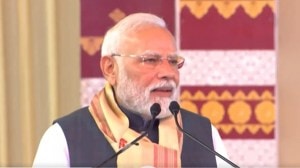Dalmiya ducks the bouncer
If Jagmohan Dalmiya was a mathematics teacher, and was presented with the Abhijit Kale episode, he would have called the solution sub-optima...

If Jagmohan Dalmiya was a mathematics teacher, and was presented with the Abhijit Kale episode, he would have called the solution sub-optimal. Like with any situation that pits two parties against each other, with neither able to offer convincing proof of guilt or honesty, the solution seeks to find a middle path that aims to do justice to both but pleases nobody. Neither Kale nor the selectors should be satisfied with this verdict which seeks to use principles of living together in a household rather than more decisive principles of law.
If Kale did indeed offer a bribe to Kiran More or Pronob Roy, the decision against him is way too lenient. Nothing less than a lifetime ban should have been in order. However if, as he claims, he merely tried to persuade them, or to influence their decision, he has committed no crime for this happens all the time. There is no law that can prevent me from calling up a selector and asking that he pick a person of my choice. The selector can ignore me or can threaten me but it is no different from a politician calling up the Prime Minister and asking for a place in the cabinet.
The reality, I suspect, is that it turned out to be one man’s word against another, that there were indications of an offer but no proof. That is serious enough but most courts would find themselves helpless in dealing with such a situation. But the BCCI had to be seen to be taking some action and hence the use of the principles of living together in a household. A little sop here, a little punishment there and everybody can pretend as if nothing ever happened.
Clearly the bulk of the matter has been left unsaid. Was Kale pushed into writing an apology letter in exchange for a small ban, so that nobody could have egg on their face? Was the Board inclined towards a milder decision for fear that anything stronger might result in another court case? So now Kale is banned for 13 months for something he didn’t do, or he is banned for only thirteen months for a serious violation. If this were a corporate crime a shareholder could demand information but the BCCI has, like the flavour of our land, always sought a compromise; an inelegant but often effective method of existence.
As Amar Singh will exist alongside Sonia Gandhi but will never visit 10, Janpath again, Kiran More, I suspect, will watch Abhijit Kale play from early next year but will never pick him again.
There is a deeper issue, though, that demands a more permanent solution. The Kale case is neither the first such instance nor will it be the last. So what happens the next time a player offers a bribe to a selector? Or worse, if a selector asks for one? Both situations are eminently possible, and indeed likely, given that the selector gets paid nothing for picking a player who gets a substantial sum. I suspect we also need to probe the most intriguing question of all. How can a player who clearly does not possess 10 lakhs of rupees offer that sum to somebody? Was he going to take a loan? Was someone going to fund him? These are darker questions.
Easier than these, but more immediately relevant, is the question of Zaheer Khan’s hamstring. On the ESPN cricket show I spoke to Javagal Srinath last week and he was convinced that Zaheer was still India’s number one bowler. There is much merit in that statement because India need a big-hearted bowler, even to bowl the old ball against Australia this year. His hamstring has now let him down three this year and that means there is either a chronic injury or he is returning to cricket too quickly. Hopefully Zaheer’s early return is just a precaution but it cannot please his captain who has so much faith in him.
It is a very long time since India has fielded a full strength bowling side in a Test match. Against Australia this October India must allow themselves the opportunity of picking Zaheer and Pathan, Harbhajan and Kumble. Anything less than that will be, to return to the theme of this article, sub-optimal.
Photos



- 01
- 02
- 03
- 04
- 05




























